Next-generation sequencing: Engineering a healthier tomorrow
Just over 20 years ago, the first sequence of a whole human genome was nearing completion. This took an investment of nearly $3 billion dollars and over 10 years work. Fast forward to today, and we are standing at the precipice of a new era of precision medicine enabled by genomic sequencing that is increasingly integrated into healthcare systems.
Abstract: Just over 20 years ago, the first sequence of a whole human genome was nearing completion. This took an investment of nearly $3 billion dollars and over 10 years work. Fast forward to today, and we are standing at the precipice of a new era of precision medicine enabled by genomic sequencing that is increasingly integrated into healthcare systems. This remarkable transition in a relatively short time is due in part to the relentless efforts of world-class teams of engineers and scientists at Illumina, who are bringing the vision of large-scale genetic testing to life through innovative genomics products. These products have been driven by advances in nanofabrication, optical systems, protein engineering, chemistry and pattern recognition, and are saving the lives of sick babies in the NICU, informing oncologists about targeted cancer therapies, and contributing to the next generation of scientific breakthroughs. However, we are still just at the beginning; less than 0.01% of all species on Earth, and less than 0.02% of the human population have been sequenced. In the future the complexity and volume of genomic information will require multiple sophisticated and scalable engineering, scientific and computational methods to achieve a more complete understanding of the contribution of the genome to biology. The integration of large-scale genomic sequencing power with advanced informatics, including a common data sharing framework and AI capabilities, is a critical next frontier in the mission to fully unlock the power of the genome to advance human health.
Bio: Susan Tousi is Senior Vice President of Product Development at Illumina, Inc., (NASDAQ: ILMN), a company on a mission to improve human health by unlocking the power of the genome. In this role she is responsible for global engineering, consumables, applications, user design, software and informatics development efforts; ensuring Illumina’s scientists and engineers continue the culture of innovation and product excellence that has been a hallmark of Illumina. Under her leadership, Illumina has been externally recognized as an innovative, smart and great place to work (including: MIT Technology Review's 50 Smartest Companies (2014-2017), Forbes’ most innovative companies (2014-2017), Computerworld’s Best Places to Work in IT (2017-2019), Bloomberg Gender Equality Index (2020) and Human Rights Campaign:100% LGBTQ equality (2020)).
Susan has been a vital asset to Illumina, navigating the organization through significant scaling and growth. Under her technology leadership Illumina has launched eight years of industry leading sequencing platforms and achieved the most innovative and expansive product portfolio in the company’s history. These include the NovaSeq™ 6000, a scalable sequencing architecture expected one day to enable a $100 genome; this platform re-defines high throughput sequencing with unrivaled throughput, ease of use, low per sample costs, and increased flexibility. In 2018 she led the acquisition of Edico Genomics, bringing the DRAGEN accelerated BioIT platform and capabilities into her group. In 2020 the DRAGEN capability was made available for on-board genomic analysis of as part of the NextSeq™ 1000 and 2000 product launches. These desktop sequencing systems include more than 75+ breakthrough technology innovations that to date have supported 26 separate patent applications.
Susan has more than 25-years of R&D and business leadership at Fortune 100 technology companies and within the life sciences industry. Formerly, Susan was as a Corporate Vice President and General Manager for Eastman Kodak’s Consumer Inkjet Systems organization. Prior to joining Kodak, Susan was an R&D program manager for Phogenix Imaging LLC, a joint venture start-up of Hewlett-Packard and Kodak. She previously spent 10 years with Hewlett-Packard in technical and management roles.
Susan holds an M.B.A. degree from UCLA and Honors B.S. in Engineering Science and Mechanics from Pennsylvania State University. Along with many academic honors, she has received numerous awards in both business and technology. In 2018, Susan was elected to the National Academy of Engineers and has since been appointed to the NAE Peer Committee.
Additional Information:
https://psu.zoom.us/j/91823970096
For password please contact Lisa Spicer @ lms8@psu.edu
Media Contact: Lisa Spicer



